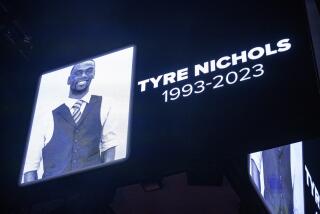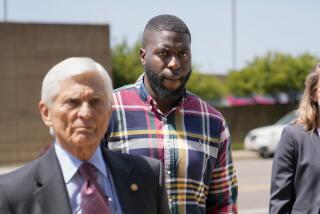Nichols’ Attorney Abruptly Rests Case
DENVER — Overwhelmed by three days of devastating testimony from survivors and relatives of the dead in the Oklahoma City bombing, the lead attorney for convicted conspirator Terry L. Nichols pleaded Friday with a federal judge to dismiss the jury and decide himself whether Nichols should live or die for his role in the most horrendous American act of terrorism.
His request denied, lawyer Michael E. Tigar quickly called only nine witnesses--many of them family members--to take to the stand and beg for Nichols’ life. And then, just as abruptly, he ended his defense case.
The sudden, unexpected chain of events means the jury, which already apparently has mixed views about Nichols’ role in the 1995 blast, will begin deciding his fate as early as Monday.
“This is enough,” Tigar told the judge, saying the 55 government witnesses who came to court here last week had unfairly prejudiced the jury against his client with their tears, sobs and heart-wrenching stories of lost grandparents, dead babies and lives forever shattered.
Nichols, 42, was convicted of conspiring with Timothy J. McVeigh in the April 19, 1995, bombing of the Alfred P. Murrah Federal Building, which left 168 people dead and more than 500 injured.
Tigar had originally advised the court that he had 60 witnesss of his own to bring to court over two or three days in order to help balance out the dreadful stories from the victims.
But as the week wore on, he was heard condemning this sentencing phase of the trial as “sadistic,” and he decided instead to cut it off.
During the three days of testimony from the nearly five dozen victims, Nichols showed no emotion. But he removed his glasses several times Friday and wiped away tears as the nine witnesses testified that he was a good father and husband, and that he was not the type of man to wish harm on anyone.
Nichols’ wife, Marife, told the jury of seven women and five men how, even in prison, her husband has tried his best to help raise their two young children, including a son, Christian, born after his father’s arrest two days after the bombing.
She said he sometimes makes flashcards for the children to help them learn the alphabet. For a while, when he was not allowed to have sharp objects like pens or pencils in his cell, he used blue toothpaste to make bright drawings on the cards he sent Christian and the couple’s daughter, Nicole.
Looking at one of the cards he sent Nicole, Marife Nichols read the inscription: “To Daddy’s Little Angel.”
Nichols’ oldest brother, Leslie Allen Nichols, described their lives growing up on a farm in Michigan, attending a one-room schoolhouse and learning to drive a tractor at the age of 8.
Leslie Nichols also told of the welding accident in 1974 that gave him third-degree burns and left his face terribly disfigured. Afterward, when he needed skin grafts, his brother was willing to help by offering his own “blood and skin,” he said.
But the doctors told Terry Nichols he could be a donor because he “was not an identical twin,” his brother said.
Under questioning from assistant prosecutor Beth Wilkinson, Leslie Nichols acknowledged that he and his brother sometimes used “fertilizer and dynamite” to blow out tree stumps on the farm--a clear reference to bring home for the jury Terry Nichols’ long familiarity with homemade explosives.
Terry Nichols’ sister, Suzanne McDonnell, also talked about farm life raising corn and wheat. She showed the jury a picture of a teenage Terry Nichols feeding a baby deer. The animal had been slightly injured when another brother, James, hit it with the tractor. the whole family then adopted the deer and named it “Jeanie,” she said.
“We brought it home and we got it nursed back to health, and so we raised it,” she said. “And many occasions we’d have it in the house.
“She loved apples, and on Sundays she always had pancakes and applesauce with our Sunday breakfast.”
It was the testimony of Lana Padilla, Terry Nichols’ first wife, and her recollections of their son, Josh, now 15, that most clearly moved Terry Nichols and brought forth his tears.
She spoke of his many attempts to make a go at life--farming, the real estate business, the Army. Since his imprisonment, she said, he frequently telephones Josh at home in Las Vegas, trying to keep up on his activities.
“Terry was not an imaginary father,” she said. “Terry is the most important person in Josh’s life.”
She said Terry Nichols reviews their son’s grades in school, often encouraging him to do better in math, reading and writing.
Because of the conspiracy conviction, Nichols now faces death by lethal injection or life in prison with no hope of release.
Times staff writer Louis Sahagun contributed to this story from Denver.
More to Read
Sign up for Essential California
The most important California stories and recommendations in your inbox every morning.
You may occasionally receive promotional content from the Los Angeles Times.











